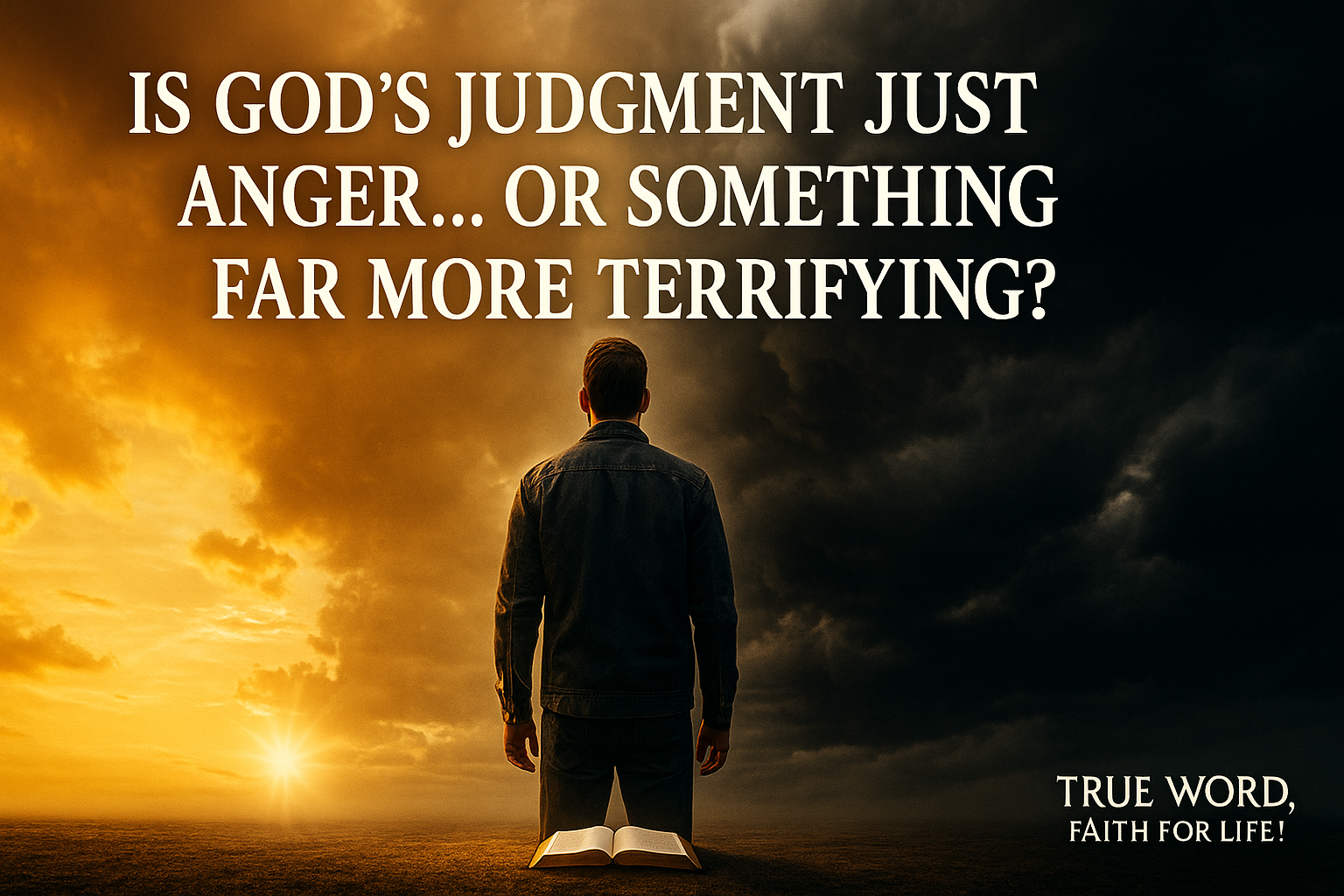Is God’s Judgment Just Anger or Something More Terrifying?

Is God’s Judgment Just Anger or Something Far More Terrifying?
WATCH on RUMBLE 10/22 6:30 PM EDT
What if the wrath of God is not fire from heaven but freedom from His restraint?
What if His judgment is not His fury, but His silence—the moment He steps back and lets humanity have what it wants most?
In Romans 1, Paul exposes the deepest truth about divine judgment. God’s wrath is not random rage. It is covenant justice in motion.
The Hebrew Scriptures reveal that wrath (chemah, aph) is God’s judicial faithfulness at work, not His loss of control. In the Ancient Near Eastern world, a king’s wrath was the legal response to covenant treachery. The same pattern plays out in Romans 1.
Paul shows that the world’s descent into idolatry, confusion, and chaos is not God’s punishment—it is the natural outcome of God releasing His grip. “He gave them over.” Three times, Paul repeats that haunting phrase.
That is divine wrath. God allows us to taste the fruit of our rebellion so that we will see the poison for what it is.
Modern life is no different. We worship screens instead of the Savior, identity instead of integrity, and self instead of the Creator. We call rebellion “authenticity.” We call sin “freedom.”
But the Gospel cuts through the noise: God’s wrath is His love refusing to participate in our delusion. His judgment exposes our need for redemption.
And the good news? The same God who lets us go is the God who came to get us back.
Your Challenge and a Choice
Where have you exchanged truth for comfort?
Where have you silenced conviction to keep your peace?
Will you keep running, or will you turn back to the Creator who still calls you home?
Prayer of Salvation
Heavenly Father, I come to You today with an open and humble heart.
I know that I have sinned and fallen short of Your glory, and I’m asking for Your forgiveness.
Right now, I turn away from my sins and turn fully toward You.
I believe that Jesus, Your Son, is the promised Messiah—that He died for my sins, was buried, and rose again on the third day, just as the Scriptures say.
Today, I call on Your holy Name. Please forgive me, cleanse me, and make me new.
Fill me with Your Holy Spirit and write Your truth on my heart.
From this day forward, I choose to follow Jesus as my Lord, my Redeemer, and my King.
Thank You for loving me, for saving me, and for making me part of Your family forever.
In the name of Jesus Christ, the King of Kings, I pray. Amen.
➡ I am so excited for you because this decision is the most important of your existence!
Contact me through TrueWordFaithforLife.com/contact and I will personally help you along the way!
Amen.
Beloved, God’s wrath is not the opposite of His love—it is the proof of it.
He lets us feel the full weight of rebellion so that we will turn back to grace.
Shalom b’Shem Yeshua.
© 2025 Dr. Shawn M. Greener. All Rights Reserved.
True Word, Faith for LIF
Study Guide – Episode 16
Is God’s Judgment Just Anger or Something Far More Terrifying?
Series: Romans: Covenant, Faithfulness, and the Grafted-In Life
In this study, we walk through Romans 1:18–32, where Paul unveils a shocking truth about divine judgment. God’s wrath is not random anger. It is His covenant faithfulness acting against covenant rebellion. Through the Ancient Near Eastern (ANE) lens, we see that wrath is not emotional rage but a deliberate judicial response to betrayal.
Humanity’s great tragedy, Paul explains, is not ignorance—but willful exchange. The truth is known. Creation declares it. But men and women have traded the truth for lies, the glory of the Creator for the comfort of creation.
This chapter calls us to face the uncomfortable reality that judgment often comes not by God’s hand striking us down, but by His hand withdrawing.
1. Wrath Revealed: The Justice of Covenant Faithfulness
Romans 1:18
“For the wrath of God is revealed from heaven against all ungodliness and unrighteousness of men, who suppress the truth in unrighteousness.”
The word Paul uses for wrath is orge (Greek) which refers to a judicial response, not emotional outrage. In Hebrew thought, the terms chemah and aph signify divine justice in motion.
Dr. Skip Moen reminds us that wrath represents God’s unchanging fidelity to His covenant. Sin violates the order He established, and His holiness must act in justice. Dr. Michael Heiser echoes this by noting that God’s wrath is the necessary reaction of a holy Creator when His creatures defy His divine order.
In the ANE world, a king’s wrath was the formal execution of judgment upon covenant-breaking subjects. Likewise, God’s wrath is His sovereign act of maintaining cosmic order.
2. The Exchange: Truth for Lies, Glory for Images
Romans 1:19–23
Paul reveals that humanity knows God through creation. The heavens themselves are His witness. Yet instead of worshiping the Creator, humanity has chosen to worship creation.
The Hebrew concept of me’ilah (treachery) captures the nature of this exchange—it is betrayal, not misunderstanding. The created world, which should lead us to worship, has become our idol.
In the ANE mindset, idols were seen as vessels for divine presence. The idol was not the god itself, but a dwelling for the god’s essence. Thus, idolatry was an attempt to control or manipulate divine power apart from relationship.
This is the heart of human rebellion: desiring control over dependence. Today, our idols are not carved from stone but shaped through technology, ideology, and self-obsession.
3. “God Gave Them Over”: The Judgment of Release
Romans 1:24–28
Three times Paul writes, “God gave them over.” This repetition is deliberate. It signifies the legal withdrawal of divine restraint.
In ancient covenant law, to “give someone over” meant to release them from protection. In judgment, God does not need to strike humanity down—He simply allows sin to run its natural course.
This is the terror of divine love: God respects human freedom even when it leads to destruction.
When we reject truth, He allows us to live in the consequences of our own deception. That is what Paul calls “the wrath revealed from heaven.”
4. The Corruption of Desire: When Worship Collapses
Romans 1:26–27
Paul’s mention of unnatural passions is not an isolated attack on one sin but an illustration of what happens when God’s design is abandoned. In Hebrew anthropology, sexuality reflects covenant. When the covenant is broken, desire itself becomes distorted.
In ANE religion, sexuality was a form of worship. Temples employed ritual prostitution to invoke fertility gods. Paul’s Roman audience understood this well—he was describing idolatry’s most visible manifestation.
When humanity dethrones God, even our most intimate longings turn self-destructive.
Today’s culture preaches the same ancient lie: “Follow your heart.” But when the heart is detached from the Creator, it leads only deeper into exile.
5. A Culture of Rebellion: When Darkness is Applauded
Romans 1:29–32
Paul lists the fruit of rebellion—envy, murder, deceit, arrogance, disobedience, and lack of mercy. Then he concludes with chilling clarity: humanity not only does these things but applauds others who do them.
This is the final stage of moral collapse: when a society celebrates what it once hid in shame.
Isaiah foresaw this when he wrote, “Woe to those who call evil good and good evil.” (Isaiah 5:20).
Romans 1 is not a political commentary. It is a divine diagnosis of every human heart apart from covenant grace.
Challenge and a Choice
Challenge: Where have you exchanged truth for comfort?
Where have you silenced conviction for convenience?
Choice: Will you continue to spiral downward, or will you return to the God who is still calling you home?
Paul’s message is not hopeless. It is holy. The wrath that reveals our ruin also reveals our need for redemption.
For Reflection and Discussion
1.How does viewing God’s wrath as covenantal faithfulness rather than anger change your understanding of divine judgment?
2.In what ways does modern culture mirror the “exchange” Paul describes?
3.Where have you personally seen God “give you over” to a desire—and what did you learn from it?
4.Why is it dangerous when sin becomes normalized and celebrated?
5.What does true repentance look like in a culture that calls evil good?
Key Takeaway
The wrath of God is not the end of His mercy—it is the revelation of His righteousness.
He allows humanity to experience the fruit of rebellion so that we might recognize our need for redemption.
For Further Study
•Deuteronomy 28–30: Covenant blessings and curses in Israel’s history
•Psalm 19: Creation as testimony of God’s glory
•Jeremiah 2: Israel’s exchange of living water for broken cisterns
•Romans 3:23–26: The righteousness of God revealed in Messiah
•1 Thessalonians 1:9–10: Turning from idols to serve the living God
⸻
Bibliography
Heiser, Michael S. The Unseen Realm: Recovering the Supernatural Worldview of the Bible. Bellingham, WA: Lexham Press, 2015.
Moen, Skip. Guardian Angel: What You Must Know About God’s Design for Women. Fort Myers, FL: At God’s Table, 2013.
The Complete Jewish Study Bible. Peabody, MA: Hendrickson, 2016.
Walton, John H. The Lost World of Genesis One: Ancient Cosmology and the Origins Debate. Downers Grove, IL: IVP Academic, 2009.
Wright, N.T. Paul and the Faithfulness of God. Minneapolis: Fortress Press, 2013.
Romans, wrath of God, covenant, judgment, rebellion, truth, idolatry, mercy, biblical worldview, podcast, study guide, Yeshua, discipleship, theology, Dr. Shawn Greener
Romans 1 explained, wrath of God meaning, divine judgment, covenant faithfulness, Dr. Shawn M. Greener, True Word Faith for LIFE, Ancient Near Eastern context, Hebrew worldview, biblical truth, follower of the Way, gospel in context, Christian theology, Yeshua HaMashiach
⸻



